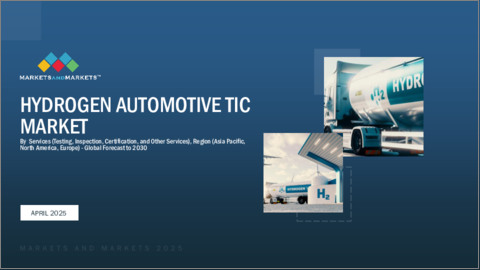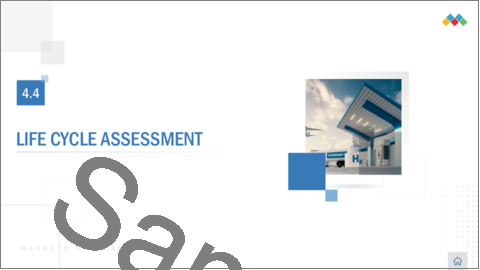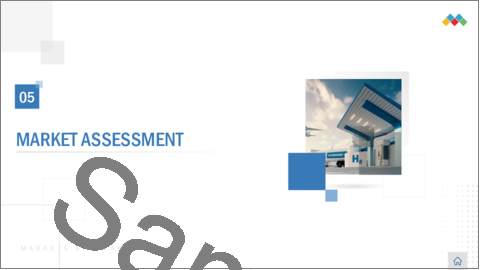|
|
市場調査レポート
商品コード
1719528
水素自動車試験・検査・認証(TIC)の世界市場:サービス別、車両タイプ別、地域別 - 2030年までの予測Hydrogen Automotive Testing, Inspection, and Certification (TIC) Market by Service (Testing, Certification, Inspection, and Other Services), Region (Asia Pacific, North America, Europe) - Forecast to 2030 |
||||||
カスタマイズ可能
|
|||||||
| 水素自動車試験・検査・認証(TIC)の世界市場:サービス別、車両タイプ別、地域別 - 2030年までの予測 |
|
出版日: 2025年05月02日
発行: MarketsandMarkets
ページ情報: 英文 171 Pages
納期: 即納可能
|
全表示
- 概要
- 図表
- 目次
水素自動車試験・検査・認証(TIC)の市場規模は、2024年の1,830万米ドルから2030年には3,580万米ドルに達すると予測され、予測期間中のCAGRは11.8%になるとみられています。
市場を牽引しているのは、水素燃料電池車の普及拡大、厳しい安全・排ガス規制、水素インフラへの投資拡大です。政府の奨励策、環境問題への関心の高まり、水素技術の進歩が品質保証の需要を押し上げています。さらに、世界の標準化への取り組みと水素補給ネットワークの拡大が、TICサービスの必要性を加速させています。
| 調査範囲 | |
|---|---|
| 調査対象年 | 2020年~2030年 |
| 基準年 | 2023年 |
| 予測期間 | 2024年~2030年 |
| 検討単位 | 金額(100万米ドル/10億米ドル) |
| セグメント | サービス別、車両タイプ別、地域別 |
| 対象地域 | 北米、欧州、アジア太平洋 |
サービス別では、水素自動車試験・検査・認証(TIC)市場は試験、検査、認証に区分されます。検査分野は、水素自動車試験・検査・認証(TIC)市場において2番目に大きい分野であると予測されています。この成長の原動力となっているのは、水素自動車とインフラのライフサイクル全体を通じて、完全性、安全性、性能を確保する必要性が高まっていることです。水素自動車は高圧システム下で運転され、燃料電池、タンク、パイプラインなどの複雑な部品を含むため、摩耗、腐食、潜在的な故障を検出するためには定期的な検査が不可欠です。各地域の規制機関は、より厳格な安全規制を実施しており、認証とコンプライアンスのために定期的な検査を義務付けています。さらに、水素補給ステーションの急速な展開と水素を動力源とする車両の増加により、現場および稼働中の検査ソリューションに対する需要が高まっています。これらの要因が総合的に、水素自動車TICエコシステムにおける検査サービスの拡大を後押ししています。
水素自動車の試験・検査・認証(TIC)市場は、車種別に乗用車、バス、小型商用車、中型商用車、大型商用車、内燃機関水素車の5つに区分されています。乗用車、バス、小型商用車、中型商用車、大型商用車、ICE水素自動車の5つのカテゴリーに分類されます。この成長の原動力は、ゼロ・エミッション公共交通機関に対する政府支援の増加と、持続可能な都市モビリティへの投資の増加です。水素バスは、バッテリー電気バスよりも航続距離が長く、燃料補給が速いため、都市間路線や高頻度路線に最適です。特に欧州とアジアのいくつかの国では、クリーン・エネルギー移行戦略の一環として水素バスを導入しています。さらに、燃料電池システム、貯蔵タンク、安全プロトコルの厳格な試験、検査、認証の必要性は、規制遵守と運行の安全性を確保するために高まっており、このセグメントにおけるTICサービスの需要をさらに押し上げています。
アジア太平洋は、水素自動車試験・検査・認証(TIC)市場において2番目に急成長している地域になると予想され、政府の強力なイニシアチブ、水素インフラの拡大、水素自動車の配備増加などがその要因となっています。日本、韓国、中国のような国々は、国家ロードマップ、補助金、水素充填ステーションや燃料電池車フリートの展開を含むインフラ開発を通じて、水素モビリティに多額の投資を行っています。日本と韓国は、水素燃料電池技術の世界的パイオニアです。中国は、特に物流と公共交通機関において、水素商用車の生産と採用を急速に拡大しています。エネルギー安全保障と排出削減を重視するこの地域の姿勢は、水素導入の幅広い推進力と一致しています。さらに、アジア太平洋には強力な自動車製造基盤があり、技術革新と様々な車種への水素システムの統合を促進しています。その結果、水素自動車エコシステム全体の安全性、性能、規制コンプライアンスを確保するために、信頼性の高い試験、検査、認証サービスへのニーズが高まっています。
当レポートでは、水素自動車試験・検査・認証(TIC)市場を様々な地域の車両タイプ別、サービス別に定義、記述、予測しています。また、市場の詳細な質的・量的分析も行っています。主な市場促進要因・抑制要因・機会・課題を包括的にレビューしています。また、市場の様々な重要な側面もカバーしています。これらには、競合情勢、市場力学、金額ベースの市場推定、水素自動車試験・検査・認証(TIC)市場の将来動向などの分析が含まれます。
目次
第1章 イントロダクション
第2章 調査手法
第3章 エグゼクティブサマリー
第4章 市場概要
- 市場力学
- 水素輸送バリューチェーン
- エコシステム分析
- 水素自動車部品のライフサイクルアセスメント
- 規制機関
- 各国政府が採用した戦略、計画、政策
- TIC参入企業のためのテスト施設
- 主要参入企業にとってのTIC市場の潜在性と課題
第5章 水素自動車TIC市場
- サービス別
第6章 水素自動車TIC市場
- 地域別
- 北米、サービス別
- アジア太平洋、サービス別
- 欧州、サービス別
第7章 競合情勢
- 競合ベンチマーキング
- サービスポートフォリオの比較
- 公共部門の見通し
- 企業評価マトリックス
第8章 企業プロファイル
- HYDROGEN AUTOMOTIVE TIC PLAYERS
- AUTO ENGINEERING COMPANIES
- HYDROGEN VEHICLE OEMS
第9章 付録
List of Tables
_
List of Figures
_
The hydrogen automotive testing, inspection, and certification (TIC) market is estimated to reach USD 35.8 million by 2030 from an estimated value of USD 18.3 million in 2024, at a CAGR of 11.8% during the forecast period. The market is driven by increasing adoption of hydrogen fuel cell vehicles, stringent safety and emission regulations, and rising investments in hydrogen infrastructure. Government incentives, growing environmental concerns, and advancements in hydrogen technology are boosting demand for quality assurance. Additionally, global standardization efforts and the expansion of hydrogen refueling networks are accelerating the need for TIC services.
| Scope of the Report | |
|---|---|
| Years Considered for the Study | 2020-2030 |
| Base Year | 2023 |
| Forecast Period | 2024-2030 |
| Units Considered | Value (USD Million/Billion) |
| Segments | Service and Region |
| Regions covered | North America, Europe, and Asia Pacific |
"Inspection segment is expected to remain the second-largest, by service."
Based on service, the hydrogen automotive testing, inspection, and certification (TIC) market has been segmented into testing, inspection, and certification. The inspection segment is projected to be the second-largest segment in the hydrogen automotive testing, inspection, and certification (TIC) market. This growth is driven by the increasing need to ensure the integrity, safety, and performance of hydrogen-powered vehicles and infrastructure throughout their lifecycle. As hydrogen vehicles operate under high-pressure systems and involve complex components such as fuel cells, tanks, and pipelines, regular inspection is critical to detect wear, corrosion, or potential failures. Regulatory bodies across regions are implementing stricter safety mandates, requiring routine inspection for certification and compliance. Moreover, the rapid deployment of hydrogen refueling stations and the growing production of hydrogen-powered fleets have increased the demand for on-site and in-service inspection solutions. These factors collectively drive the expansion of inspection services within the hydrogen automotive TIC ecosystem.
"Buses: The second-largest segment of the hydrogen automotive testing, inspection and certification (TIC) market, by vehicle type."
By vehicle type, the hydrogen automotive testing, inspection, and certification (TIC) market has been segmented into five categories: passenger cars, buses, light commercial vehicles, medium duty vehicles, heavy duty vehicles, and ICE hydrogen vehicles. The segment, buses, is expected to capture the second-largest share of the market by vehicle type. This growth is driven by increasing government support for zero-emission public transportation and rising investments in sustainable urban mobility. Hydrogen-powered buses offer longer range and faster refueling than battery-electric counterparts, making them ideal for intercity and high-frequency routes. Several countries, particularly in Europe and Asia, are deploying hydrogen buses as part of their clean energy transition strategies. Additionally, the need for rigorous testing, inspection, and certification of fuel cell systems, storage tanks, and safety protocols is growing to ensure regulatory compliance and operational safety, further boosting TIC service demand in this segment.
"Asia Pacific is expected to be the second-fastest-growing region in the hydrogen automotive testing, inspection, and certification (TIC) market."
Asia Pacific is expected to be the second-fastest-growing region in the hydrogen automotive testing, inspection, and certification (TIC) market, driven by strong government initiatives, expanding hydrogen infrastructure, and increasing deployment of hydrogen-powered vehicles. Countries like Japan, South Korea, and China invest heavily in hydrogen mobility through national roadmaps, subsidies, and infrastructure development, including the rollout of hydrogen refueling stations and fuel cell vehicle fleets. Japan and South Korea are global pioneers in hydrogen fuel cell technologies. China is rapidly scaling up its production and adoption of hydrogen commercial vehicles, particularly in logistics and public transportation. The region's focus on energy security and emission reduction aligns with the broader push for hydrogen adoption. Additionally, Asia Pacific has a strong automotive manufacturing base, fostering innovation and the integration of hydrogen systems into various vehicle types. As a result, there is a rising need for reliable testing, inspection, and certification services to ensure safety, performance, and regulatory compliance across the hydrogen automotive ecosystem.
Breakdown of Primaries:
In-depth interviews have been conducted with various key industry participants, subject-matter experts, C-level executives of key market players, and industry consultants, among other experts, to obtain and verify critical qualitative and quantitative information, as well as to assess future market prospects. The distribution of primary interviews is as follows:
By Company Type: Tier 1 - 65%, Tier 2 - 24%, and Tier 3 - 11%
By Designation: C-Level Executives - 30%, Managers - 25%, and Others - 45%
By Region: North America - 21%, Europe - 25%, and Asia Pacific - 54%
Note: Others include product engineers, product specialists, and engineering leads.
Note: The tiers of the companies are defined based on their total revenues as of 2023. Tier 1: > USD 1 billion, Tier 2: From USD 500 million to USD 1 billion, and Tier 3: < USD 500 million
The hydrogen automotive testing, inspection, and certification (TIC) market is dominated by a few major players with a wide regional presence. The leading players are TUV SUD (Germany), UL LLC (US), Applus+ (Spain), TUV Rheinland (Germany), Kiwa (Netherlands), Intertek Group plc (UK), DEKRA IN (Germany), Societe Generale de Surveillance (SGS) SA (Switzerland), Southwest Research Institute (SwRI) (US), and Apave (France).
Research Coverage:
The report defines, describes, and forecasts the hydrogen automotive testing, inspection, and certification (TIC) market by vehicle type and service for various regions. It also offers a detailed qualitative and quantitative analysis of the market. The report provides a comprehensive review of the major market drivers, restraints, opportunities, and challenges. It also covers various important aspects of the market. These include an analysis of the competitive landscape, market dynamics, market estimates in terms of value, and future trends in the hydrogen automotive testing, inspection, and certification (TIC) market.
Key Benefits of Buying the Report
- The hydrogen automotive testing, inspection, and certification (TIC) market is influenced by the accelerating shift toward clean mobility, stringent environmental regulations, and the rapid deployment of hydrogen fuel cell vehicles across various transportation sectors. Growing investments in hydrogen infrastructure, coupled with government incentives for zero-emission vehicles, are propelling the need for rigorous testing, inspection, and certification services. As automotive manufacturers scale up hydrogen vehicle production, ensuring safety, performance, and compliance with international standards becomes critical. The expansion of hydrogen refueling networks, technological advancements in fuel cell systems, and the need for lifecycle quality assurance further fuel market growth.
- Product Development/Innovation: The hydrogen automotive testing, inspection, and certification (TIC) market is focused on enhancing safety, accuracy, and efficiency in testing, inspection, and certification processes. Companies invest in advanced diagnostic tools, real-time monitoring systems, and automated testing technologies to meet evolving regulatory standards. Innovations include non-destructive testing methods for high-pressure hydrogen components and digital platforms for compliance tracking. The integration of AI and IoT into TIC services is improving data-driven decision-making. These advancements support the growing complexity of hydrogen-powered vehicles and infrastructure, ensuring reliability and accelerating global adoption of hydrogen mobility solutions..
- Market Development: Hyundai Motor Company unveiled its new XCIENT Fuel Cell tractor, a commercialized Class 8 6x4 fuel cell electric model, for the North American commercial vehicle market at the Advanced Clean Transportation (ACT) Expo.
- Market Diversification: Nikola Corporation, a global company in zero-emissions transportation, and E. ON SE, an energy supply and infrastructure solution provider, signed an agreement with The Richter Group, a leading provider of individual logistics services, to decarbonize Richter Group's vehicle fleet by supplying hydrogen-electric trucks, the necessary green hydrogen, and the refueling infrastructure.
- Competitive Assessment: Assessment of rankings of some of the key players, including TUV SUD (Germany), UL LLC (US), Applus+ (Spain), TUV Rheinland (Germany), Kiwa (Netherlands), Intertek Group plc (UK), DEKRA IN (Germany), Societe Generale de Surveillance (SGS) SA (Switzerland), Southwest Research Institute (SwRI) (US), and Apave (France).
TABLE OF CONTENTS
1 INTRODUCTION
2 RESEARCH METHODOLOGY
3 EXECUTIVE SUMMARY
4 MARKET OVERVIEW
- 4.1 MARKET DYNAMICS
- 4.2 HYDROGEN TRANSPORTATION VALUE CHAIN
- 4.3 ECOSYSTEM ANALYSIS
- 4.4 LIFE CYCLE ASSESSMENT OF HYDROGEN VEHICLE COMPONENT
- 4.5 REGULATORY BODIES
- 4.6 STRATEGIES, PLANS, AND POLICIES ADOPTED BY VARIOUS GOVERNMENTS
- 4.7 TESTING FACILITIES FOR TIC PLAYERS
- 4.8 MARKET POTENTIAL AND CHALLENGES IN TIC MARKET FOR KEY PLAYERS
5 HYDROGEN AUTOMOTIVE TIC MARKET
- 5.1 BY SERVICES
6 HYDROGEN AUTOMOTIVE TIC MARKET
- 6.1 BY REGION
- 6.1.1 NORTH AMERICA, BY SERVICE
- 6.1.2 ASIA PACIFIC, BY SERVICE
- 6.1.3 EUROPE, BY SERVICE
- 6.1.3.1 BY COUNTRY
7 COMPETITIVE LANDSCAPE
- 7.1 COMPETITIVE BENCHMARKING
- 7.2 SERVICE PORTFOLIO COMPARISON
- 7.3 PUBLIC SECTOR OUTLOOK
- 7.4 COMPANY EVALUATION MATRIX
8 COMPANY PROFILES
- 8.1 HYDROGEN AUTOMOTIVE TIC PLAYERS
- 8.2 AUTO ENGINEERING COMPANIES
- 8.3 HYDROGEN VEHICLE OEMS






